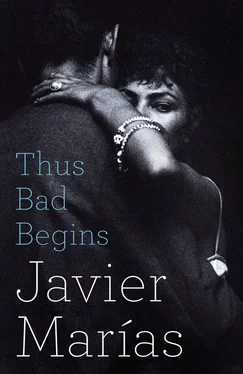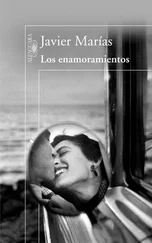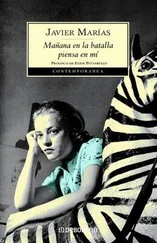Anyway, I took to following her when she went out on her own and on foot, on afternoons when she wasn’t giving one of those theoretical private lessons at the home of a student. I would hear her getting ready, humming to herself without realizing that she was, an unusual sound, because when she was alone, she tended to be serious, not to say sad, my presence almost invisible to her — until, that is, it ceased to be — and she viewed me in a kindly, friendly fashion, but otherwise ignored me. When I could hear the click-clack of the slenderest of her high heels (she put these on last, and every shoe sounds different to the discerning ear), I knew she was about to leave. I would wait for a minute after she had closed the front door, then cautiously go after her and, spotting her just a short way from the street door, I would begin my pursuit; she cut such a tall, striking figure that I never lost her among the other passers-by. She would stop now and then to look in a shop window or pause at the traffic lights, but otherwise, she walked at a brisk pace, determined and even jaunty despite her height, and during these walks, I noticed that, despite her sometimes three-inch heels, she could walk without wobbling or stumbling and without them distorting her legs, which remained straight and erect; I was also able to contemplate at my leisure the sway of her skirt, a rare sight these days, most women having forgotten how to walk gracefully, which is not the same as swinging your hips, or not necessarily. Her flesh was so abundant and firm when seen from behind — the only view available to the persistent pursuer — that no fabric could entirely conceal or suppress it, I had the sense that I was admiring not only her visible, vigorous calves, but also her naked thighs and pert buttocks, even though they were covered. This is why Muriel considered her fat. Or perhaps he only called her that.
The first time I followed her, she went to a strange place near the top of Calle de Serrano, where there are plenty of old mansions and a few shops, and I saw her vanish through the doorway of one of the former. When I went closer, after prudently waiting for a few minutes, I saw that it was not a private house owned by the wealthy, but a kind of sanctuary called Our Lady of Darmstadt, or so it said on a sign made of ceramic tiles. I peered in, and even from the street I could see a small, well-kept courtyard and a brief flight of double stairs leading up to a large, raised garden and a couple of low, two-storey buildings, which looked rather cosy, with their white wood lattice windows, like foreign windows from more northerly climes; both garden and buildings were visible from down below; it had the air of being a posh private school, but there was not a voice or a sound to be heard. To the right, in the entrance, was a lodge with a sign saying ‘Information’, so this was presumably a place open to the public; to the left was another identical lodge with a sign bearing the words ‘The Father Gustavo Hörbiger Room’, the sign consisting of blue lettering on white tiles, like the sign in the middle of the courtyard, which greeted visitors with: ‘Come and you will see’; I don’t know why religions always address even complete strangers in such familiar terms. Despite this open invitation, however, I did not at first dare to go any further, just in case Beatriz saw me from wherever it was she had gone. There was no movement or activity, no sign of life; even the information lodge, I discovered, was empty, and so I was obliged to remain uninformed, at least just then. I was getting bored standing outside on the pavement and so I decided to risk it and enter, gingerly, almost stealthily, even though I could easily be spotted in that open space. When no one came out to meet me, I carried on up the short stairs and took a stroll around the very kempt garden, at the far end of which stood an ugly cream-painted chapel with an exaggeratedly pointed slate roof and, near the very plain belfry, one tiny window very high up, it certainly wouldn’t let in much light, and the chapel itself resembled a bunker, but one with a vaguely fairy-tale, vaguely German look about it, as suggested by the name of the place — Darmstadt is in the state of Hesse, near Frankfurt and not far from Heidelberg — and of that Father, whose first name had been Hispanized to Gustavo. The chapel was firmly locked, and on the door was a notice protected by glass, which read: ‘Our Lady of Darmstadt Sanctuary, Madrid. Open every day from 08.00 to 22.00’, which was wrong for a start, given that it was then about five o’clock in the afternoon. There followed a list of communion services and, after that, some special mass for the ‘renewal of vows’, which took place ‘on the 18th of every month’ at 20.30, a time at which, depending on the season, it would either be getting dark or already night. ‘Something extraordinary must have happened to these people on the eighteenth day of some month in some year,’ I thought somewhat lamely. ‘Perhaps the Virgin made a mass appearance to every single one of Darmstadt’s inhabitants.’ What I found strangest of all was that, in the garden, along with the plant pots and the flower beds, there were, in the shade of the various tall trees, benches and small round tables and comfortable chairs, all in white, some already set out and others piled up as they are on café terraces at closing time, as if drinks or snacks or aperitifs might be served there or as if it were a venue for festive gatherings. ‘Perhaps when there’s a christening or a wedding in the “bunker”,’ I thought, again rather pointlessly.
I don’t quite know why — perhaps it was the ivy-clad walls and the immaculate lawn — but I was reminded vaguely of the house in which Cary Grant both was and wasn’t kidnapped and held in North by Northwest and, at the same time, although very different and set in a different country — but then directors with real style leave their mark on everything and bring together apparent opposites — of the garden in the part of London where James Stewart went looking for Ambrose Chappell in The Man Who Knew Too Much , I had just seen both films at a Hitchcock season at the Filmoteca, to which Muriel had insisted on taking me — and to which I more than happily went — saying that you had to see his films over and over, because with each viewing you discovered and learned something new, something you hadn’t noticed before. I had a sudden feeling that the exquisite James Mason or the ominous Martin Landau might suddenly appear in the garden, or that a group of angry taxidermists or the slightly cross-eyed actress Brenda de Banzie would emerge from the sanctuary, Muriel knew all the supporting actors (‘You never know when you might need them’) and pointed out their names to me and taught me to recognize them. It occurred to me that, just like Brenda the Strabismic, who, in the film, was hiding in the Ambrose Chapel — hence the confusion with Ambrose Chappell — Beatriz might have slipped in there, alone or accompanied, and bolted the door from the inside. And so, very cautiously, I approached from one side, where there was a much larger and lower window than the one on the chapel’s façade, and peered in as best I could, trying to ensure that I would not be seen, even in silhouette. But there was no one there, the place was deserted and rather too Germanically dark and unadorned, too much so for a Catholic chapel in southern Europe.
I became intensely curious, and curiosity makes us lose all caution. Especially when you begin to become accustomed to observing and eavesdropping without being seen, which anyone living or working in someone else’s house inevitably does. Plus, you’re unlikely to be found out, because you always have the excuse of chance, accident or coincidence, you’re always around and the other inhabitants forget that you’re there. However, I was also becoming aware that I was actively developing this habit and beginning to enjoy it, the habit of espionage or voyeurism, whatever you choose to call it, the latter being only a pretentious term to describe the former. Muriel was partly to blame, I told myself on the rare occasions when my conscience pricked me, although only very lightly: in a sense, he had encouraged me to take up spying, urging me to keep a close eye on Dr Van Vechten and see what I thought of him and store away my impressions — or hoard them — until he inquired about them; and as I said, I would, at the time, have done almost anything he asked, keen to do whatever I could to please him. Up until then, I had carried out his instructions to the letter: I had, of course, met Dr Van Vechten, as Muriel had foreseen, and paid close attention, keeping the strictest silence (‘Don’t confuse me by taking the initiative,’ he had warned), and he had so far asked me nothing, whether I liked the man or what I thought, nor had he told me to forget the whole conversation, ‘as if it had never happened’. The only reason I haven’t as yet spoken about Jorge Van Vechten, who was almost as much of a regular as Rico and Roy, Gloria and Marcela and others, is that my boss had not yet indicated which path I should take, but I will speak about him soon.
Читать дальше












